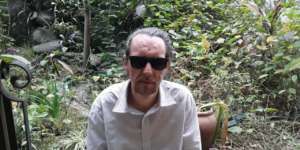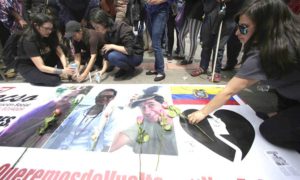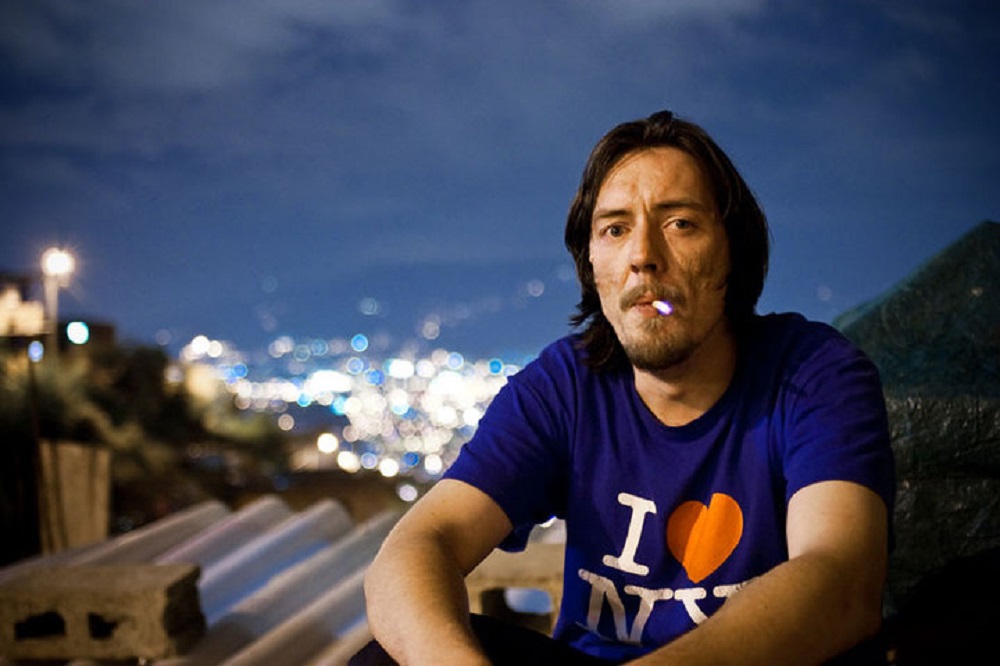Colombia Reports Founder Adriaan Alsema on covering a country like Colombia, and the threats foreign and local journalists face
It’s no surprise that journalists in Colombia face threats, but it might be surprising to learn that journalism itself is under threat – and not just from the violence that so characterizes this country. International media outlets have traded in the foreign correspondent for the poorly-paid freelance journalist, and reporters on the ground here find it increasingly difficult to sustain themselves. Recently, a new front has opened up in the war on journalism, and the threat is coming from Colombia’s Migration Office.
Here, Dutch journalist Adriaan Alsema sits down with MiKolombia to talk about his decade running Colombia Reports, the state of Colombian journalism, and its prospects for the future.
MiKolombia: You recently had some visa trouble that threatened your legal status in the country, and indeed the continued existence of Colombia Reports. Can you tell us about this?
Adriaan Alsema: Because both I and Colombia’s migration bureau are chaotic, I was left without a visa for years. I always informed Migration about this and was always told there was no problem as long as I paid my fine when leaving the country. After I left the country in order to resolve the issue and return with the appropriate visa, I started running into all kinds of weird obstructions imposed by individual officials who apparently didn’t want me back in the country. They lost.
MiKo: You’ve said you have concerns about your safety and health. This isn’t the first time you’ve felt this way. What’s happened recently that makes you fearful, and do you have any idea who might want to do you harm?
AA: While I was in the Netherlands to sort out the visa issues there was this one former intelligence executive who is now employed by Migration who was pulling all kinds of stunts to keep me out of the country. At one point it seemed I wasn’t allowed back in Colombia for five years, which would mean I would lose my home, my friends and my belongings. This gave me anxiety attacks. When I learned later someone allegedly was changing my personal information in the migration systems, these attacks got worse. Furthermore, I was running out of food because I was largely impeded from working. I don’t believe anyone would want to do me physical harm, but I do believe there are people who wouldn’t miss an opportunity to make my life miserable.
MiKo: Who was this “intelligence executive,” and how did you find out about this person working against you?
AA: The guy’s the current vice-director of migratory verification. He wrote the Dutch Embassy in November last year saying that I wasn’t allowed back in the country until August 2022. He used to be the regional vice-director of intelligence agency DAS here in Medellin.
MiKo: You recently told us that three people you know/work with have been murdered. Can you say what happened exactly?
AA: No, I would like to keep this private. Many people in Medellin have lost loved ones or friends because of the violence, I am one of many.
MiKo: You’ve also said that Colombia Reports has been the target of hackers and cyber-attacks – what kind? How are the attackers going after you exactly?
AA: Hacker attacks are common in news media, especially in Latin America. The most common ones are DDoS attacks that try to overload your server. Attacks like these are constant and relatively easy to counter. One attack was a lot more sophisticated and actually damaged the server’s hardware. Most recently my password was hacked and malware was inserted. It’s a constant threat that requires a lot of resources to prevent or resolve.
MiKo: Do you have any idea who was attacking you and their motivations for doing so?
AA: It’s impossible to determine the motives or perpetrators because generally you can’t see where the attack is coming from.
MiKo: What do you do to defend the website from these attacks?
AA: Cloudflare is perfect to fence off the DDoS attacks and is relatively cheap. In case an attack successfully damages the website, the guys responsible for the server have to jump in and clean whatever malware is detected. In a worst-case scenario, we use a back-up of the website from before the attack and manually return the content that was published after the attack and could be infected. It’s a drag, but it’s become part of the routine.
MiKo: When something major takes place in Colombia (a disaster, peace accord voted down, etc.) foreign media reach out to you for your perspective on the issue, and you usually abrasively tell them to piss off. Why?
AA: When something big happens I am generally very busy trying to cover it myself. But most importantly, the tragedy in contemporary journalism is that many commercial news media have fired their foreign correspondents. Freelance journalists are getting paid less and less. These are my colleagues and often my friends. If a foreign news outlet wants reports from the ground, they shouldn’t have sacked correspondents or should pay freelancers enough so they can sustain themselves. I’m not going to stab my colleagues in the back by giving information for free to for-profit news media.

Out of the Wilderness: Alsema seen in his back garden in Medellin. The Colombia news and analysis website, entering its 11th year, has managed to cultivate a large and loyal following, and has seen its fair share of crises as well.
MiKo: Colombia is a never-ending stream of inexplicable tragedies, violence, incompetence and corruption, and the news cycle here can be depressing. You’re also more often than not a one-man operation. What do you do to cope and keep going?
AA: I have only been a one-man operation during the visa drama, or “Adriaanovela” as one reader poetically put it. I couldn’t let in any interns, because I wasn’t sure if I was going to be in the country. Usually there are multiple people involved and I can sit back a bit. When the news is very sad I cry. When work is very stressful I smoke a doobie or call a girlfriend. Sometimes I don’t cope at all. Colombia and life in general has taught me to be resilient though, I always seem to bounce back.
MiKo: You don’t like commercial interests conflicting with your independent journalism, but Colombia Reports was in “crisis mode” for a while, as you’ve put it. You even said that you struggle to feed yourself. Might allowing some profit structures help you sustain not only the publication, but also yourself?
AA: Thanks to the financial support of readers, Colombia Reports is no longer in crisis mode and I am eating healthy again. The website is not generating profit, but is generating the necessary revenue to be sustainable and provide me with the monthly income I need to sustain myself. Journalists are not businessmen, we’re not in it for the money. Profit is a business thing and I’m not a businessman. If revenue goes up, I just spend it on more or better journalism.
MiKo: Not even by, say, allowing more internet advertising space on the website than just Google Ads?
AA: Fire brigades would also become more profitable if they put advertisements on their trucks, but good luck trying to explain that to a fireman. In fact, fire brigades would be even more profitable if they have people on staff setting fire to things so that the trucks can drive around with their advertising more frequently, but again, good luck explaining that to a fireman.
The fundamental problem with advertising is that it converts an audience into a product that is sold to advertisers. Journalists generally find that reality rather embarrassing or vulgar. Journalists are not in it for the money, we are generally happy if we are able to provide for ourselves and our families just like the next guy. I got into journalism because I find it highly gratifying that I am able to serve the public, I love my job. I wouldn’t be a journalist or find the personal gratification if I put profit above journalism.
“When I learned someone was allegedly changing my personal info in the migration systems, my anxiety attacks got worse.”
MiKo: How much of this position stems from not wanting commercial interests to conflict with your journalism, and how much of it is from your anarchist/punk ideology?
AA: It’s not really an ideology, it’s just a set of values. I used to be in a band, right? Now, I was in a band because I like making music, not because I wanted to be rich or famous. The DIY ethics associated with punk and anarchism allowed me to imagine a journalistic platform that was not about getting rich or famous, but just about journalism, freedom and independence. I’m not pursuing an ideology, I just want to be an independent journalist enjoying the freedom of the press.
MiKo: You’ve been almost entirely reader (and parent) funded for a while now. Do you believe that this funding model is sustainable?
AA: It took me ages and cost my parents tens of thousands of dollars to figure out a model that was sustainable, and I would’ve failed had it not been for the invention of crowdfunding. When I began Colombia Reports in 2008 the concept of crowdfunding didn’t exist. Whoever invented it should be awarded the Nobel Prize for Economics, because it has created opportunities for countless entrepreneurs, artists, academics and journalists who do not have access to capital.
MiKo: In 2012 you took on private investors to secure funding to keep Colombia Reports going. What did the deal entail, what did it teach you, and why did the deal ultimately fall apart?
AA: The investment gave me access to capital that allowed Colombia Reports to invest in commercial activity. In hindsight this was a mistake because I was never interested in making money, I was just looking for ways to do journalism. When we were negotiating and the investors started talking about “equity,” I had to ask them what that meant because I didn’t have a clue. Fortunately, the investors were really cool guys and agreed to dissolve the agreement when we found out our purposes were irreconcilable. I am still paying one of the guys back. I guess they learned never to do business with me again, and I learned that I was even less interested in engaging in commercial activity than I assumed before.
MiKo: Colombia’s Migration office has been making it increasingly difficult for foreign journalists to obtain or renew visas in order to work here legally, by putting in place prohibitive costs and almost-impossible-to-meet document requirements. What do you think is behind this?
AA: I’m not sure if there is anything behind it. I believe that they simply didn’t consider journalists when creating the new migration law in 2017. When the Foundation for the Freedom of Press (FLIP) and the correspondents pointed out the disastrous consequences, the government was very quick to promise that this would be corrected. The problem is that the government lacks the incentive to effectively resolve the issue and doesn’t really have an interest in facilitating international journalism.
MiKo: Because of the visa roadblocks, a number of journalists have left the country, and others may have to leave. You were part of a campaign with other media and advocacy groups to persuade Migration to remove their roadblocks. What were the results of this campaign?
AA: There is a big discrepancy between what the government says and what it does. Like I said, they promised to resolve the situation, and specifically change the decree that effectively forced freelance foreign correspondents to leave. But at the same time, they have refused to acknowledge the problem and were even less help resolving the problems the journalists that are currently in the country are facing because of the new migration law. Journalists will always be a pest for people in power, especially in a country with so much corruption as in Colombia. We’re going to have to continue fighting to recover our freedom and if we are able to recover this freedom, we’ll have to continue fighting to maintain it.
Related: Peace in Colombia? What Peace?
MiKo: You’ve been a critic of both the Colombian media, and of international coverage of the country. What are some strengths/weaknesses you see in the Colombian media?
AA: The strength of the media would be in the courage of many journalists. If I were a Colombian, I would probably have picked another career, considering the conditions in which many of my colleagues work.
The weaknesses are many. For one, while journalism’s purpose is to provide checks and balances of those in power, in Colombia the media have become propaganda tools for those in power and thus fail to fulfill their civic duty. This is partly because of the close relationship between media owners and politicians, but also because many news media are financially dependent on government advertising funds. This is aggravated by a traditionally authoritarian culture that permeates in the media. To question authority, one of the principal activities of journalists, is often confused with acts of insurgency.
Another huge problem is that individual journalists, rather than their publishers and broadcasters, are legally liable. In most countries, employers are legally responsible for what is published in their media outlet and will provide attorneys if a disgruntled subject decides to sue. In Colombia, the journalists are sued personally. Because no journalists can afford a lawyer, they are inhibited from publishing work if the chance exists they may be sued, for example, on libel or infamy charges.
The ongoing stigmatization of journalists as “narco-terrorist associates,” “communists” or “useful idiots” is a direct threat to our colleagues’ physical security.
MiKo: How about in the foreign press?
AA: Foreign media have been cutting cost to the extent that most correspondents work freelance, which for most is unsustainable. This leads to a high turnover of reporters who are increasingly ignorant of their subject. Media have become superficial and provide no context that allows a news consumer to comprehend why something is happening, mainly because journalists have lost the institutional knowledge that used to provide authority to their reporting. Furthermore, many foreign journalists are over-reliant on government sources that, disgracefully, are unreliable in Colombia. This leads to journalists doing little more than disseminating propaganda rather than testing the veracity of propaganda.

People gather to mourn the murders of three Ecuadorean journalists in southern Colombia in April, 2018. “Journalists are facing increased aggression,” Alsema says, and not just in Colombia.
MiKo: Covering the country is a lot more dangerous for local journalists than it is for foreign ones. What do you think accounts for this?
AA: Everything. Local media companies do not provide their journalists with the adequate legal protection and do not back them up when they are in danger. Authorities cannot be trusted with the protection of journalists as bodyguards are often used as intelligence agents. Citizens continue to echo the stigmatization coined by political or armed forces, which puts us at risk.
MiKo: After more than a decade living and doing journalism in Colombia, what advice would you give to young journalists just starting out?
AA: Be prepared for hardship. The conditions in which we work are unfavorable. In order to survive and do a good job for an extended period of time, one needs to be highly productive and persistent in growing a contact database that will allow them access to sources, and cultivate confidence with these sources. This process takes years. The initial years of working as a freelance correspondent will not result in the work you’ll later be proud of.
“The stigmatization of journalists as ‘narco-terrorist associates’, ‘communists’ or ‘useful idiots’ is a direct threat to our security.”
MiKo: How has your latest donation drive been going, and how close are you to meeting your $1,000 target?
AA: The last donation drive almost instantly ended the crisis Colombia Reports was in. I met the initial $1,000 goal and am now pushing our secondary goal in order to expand our activities and hopefully hire another journalist.
MiKo: Are you saving some of that funding for when the next crisis strikes?
Right now I make enough to make ends meet. The idea is to create a buffer, but I’m not there yet.
MiKo: What is Colombia Reports’ prospects for long-term viability? Where do you see yourself and the publication in five years’ time? How about in ten?
AA: I am more optimistic than ever about the long-term viability. I did not expect to meet the sustainability goal this quickly, I underestimated the popular support there exists for independent news outlets like mine. I believe the challenges in regards to the continuity of journalism are not necessarily financial, but broader or more profound. Journalists are facing increased aggression, not just in Colombia but even in countries like the United States where we believed the freedom of press was pretty solid.
The future of journalism depends largely on the strength of democracy, and I am very concerned about the deterioration of democracy and its principles. I have no idea where this is going in the coming years.
MiKo: You may be optimistic about the future of journalism, but are you optimistic about the future of Colombia in that time frame?
AA: I honestly have no idea. Colombia is not isolated from global trends. The deterioration of democracy that you see in several parts of the world is also affecting Colombia, which never had a very strong state system, and over the past 200 years has had like 13 or 14 internal armed conflicts. It’s not unlikely we fall back into another armed conflict or that the state fails again, if it’s not already failing.
You can support Colombia Reports by becoming a Patreon contributor or by making a one-time donation.

Journalist. Misfit. Malcontent. Provocateur. Is a better Colombia is possible? We’re starting to have doubts.

